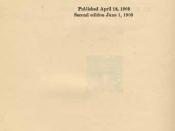William Edward Burghardt Du Bois was born in Great Barrington, Massachusetts. He graduated from high school at age 16, as the valedictorian and only black in his graduating class. Du Bois received his bachelor's degree from Fisk, and won a scholarship to attend Harvard University. At Harvard, Du Bois received his second bachelor's degree. He earned his master's and his doctoral degree as well. As violence against blacks increased in the South, Du Bois followed reports about the reoccurrence and growing number of lynchings. He called each "racially motivated killing a scar upon his soul." Du Bois became a very influential African- American socially and politically. To briefly describe him; Du Bois was an educator, editor, writer, thinker, and leader. Among his many accomplishments remains one his books entitled The Souls of Black Folk.
The Souls of Black Folk is a remarkable collection of essays written by William Edward Burghardt Du Bois. The Souls of Black Folk was published in 1903. Upon the book's release, criticism both negative and positive emerged. The Norton Critical Edition presents critics such as: William James, John Spencer Bassett, John Daniels, Dickeson D. Bruce, Jr., Robert Gooding -Williams, David Levering Lewis, Nellie McKay, Susan Mizruchi, Arnold Rampersad, Eric Sundquist and Shamoon Zamir offered reviews on The Souls of Black Folk. Criticism on this work appeared in various newspaper articles and in some books.
Reviews and criticisms on The Souls of Black Folk took different approaches. Some summarize the book, some of the reviews analyze Du Bois approach and his ideals and others give an account on how the book was received. In David Levering Lewis's 1993 work, W. E. B. Du Bois: Biography of a Race, Lewis provided an overview of the initial reception of The Souls of Black Folk . Lewis offered the...


